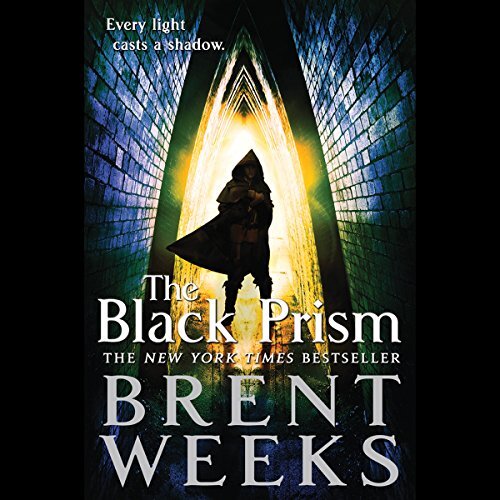The Lightbringer series by Brent Weeks sits perfectly at the intersection of my interests in fantasy epics and theology. If your interests are the same, and you don’t mind fiction seasoned with a dash of rude humor, you may love it like I did. (Nota Bene: Sometimes it’s a really hearty dash.)
I don’t know if I’m recommending a book here, or an exercise program. For me, they’re more or less intertwined. About a year and a half ago I decide to commit myself to daily exercise. I have an ambitious movement goal on my watch, and I end most days walking a loop in my neighborhood, burning calories. It’s been effective for me, and I walk an average of 2 miles a day more than I did two years ago, and burn an extra 250 calories a day, which translates to an annoyingly small amount of food. But, I digress.
Most days I reserve the walking time for listening to fiction on audio books. I don’t know when it happened, but somewhere in my life I shifted to prefer audio, maybe because I can walk and not get too restless and too quickly distracted form my “reading”. As a result, having a solid book to listen to helps me look forward to the walk, and some days it’s vice versa.
I say all this because the first thing you need to know about the Lightbringer series is the sheer length of it. I have no idea how many pages, but the audio versions, performed excellently by Simon Vance, come in at about 135 hours. Like I said: I walk a lot. I honestly don’t know how anyone has time for such a series unless you do walk a lot, so that’s why I’m recommending both the books and the walking.
Weeks has crafted a wonderful fantasy world, with a special blend of points of similarity and departure with our own world. The particular magical device the book leans heavily on worked for me—though some reviewers have found it overly complex.
What I really loved about the book was the way the long arc of the story treats theological themes. From the divine image born by humanity, to an account of the brokenness and corruption of that image, the story resonates with theological motifs that are treated deftly. Indeed, the story progresses through theology in a sophisticated way, allowing the reader to experiment with different ways of thinking about God along the way. Weeks is not bashful about including biblical allusions, and readers who know their Bibles will find themselves discovering additional layers to parts of the story by calling to mind the biblical source material.
Of particular significance is the way the story treats what theologians call “Theodicy”, the way we understand God in the light of human suffering. It may be that narratives and stories provide the very best way of studying the subject. A narrative generates empathy, and theodicy without empathy ends up being a little soulless and unhelpful. Fictive narratives almost do the job even better, allowing us to consider the suffering of the characters with just a smidge of distance—we’re emotionally involved, but without the high stakes that we have with a real flesh and blood person we know. Consider a spectrum of emotional involvement when it comes to thinking about suffering. From least to greatest emotional involvement it kind of goes like this:
Abstract theology -> fiction -> people you don’t know -> people you know personally
A full theodicy should work on all of those different levels—but it’s a tall order, and in particular, I think we struggle to bridge the gap if we simply try to leap from:
Abstract theology -> people you know personally
There’s just too much pressure there—we have to make our abstractions fit the experiences of our personal circles, because we’re deeply invested emotionally. It makes it hard to actually do the work of theodicy, probing for a way of understanding God’s presence in a hard cosmos.
Fiction can play an important role, helping us test out ways of thinking about suffering, and God’s view of it without the highest stakes. We can be empathetic, but not so enmeshed that we can’t test out ideas. Like stepping stones across a creek, good stories help us build a bridge between the abstractions of theology and the sufferings we know about, bear witness to, and even experience ourselves.
The Lightbringer series does this well, with a cast of round characters who sometimes bring evil upon their own heads and are sometimes the victims of other’s choices. The theological setting—a world of faith that intersects with our own, but is not identical–allows for Weeks to test out ways of thinking of suffering and God’s view of it, iterating as some accounts are found insufficient to the task by the characters along the way. The characters in the story refuse to settle for easy answers as they meet their hardships, and the reader goes along that journey with them, testing more nuanced ways of thinking about God as the story goes.
There’s substance to this series—but lots of fun along the way, too. It’s a story that somehow reveres God while being wildly irreverent at points. I loved it.
If that sounds like the kind of thing you might like, give it a try. But you may need to get a fresh pair of walking shoes, too.

